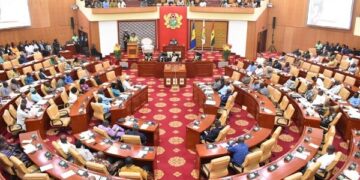John Jinapor, the ranking member on Parliament’s Mines and Energy Committee, has stated that he will use every parliamentary tool at his disposal to force authorities of the National Petroleum Authority (NPA) to respond to inquiries regarding 600,000 barrels of oil allegedly brought to Ghana from Russia.
After Russia invaded Ukraine last year, the European Union issued a directive asking nations to avoid doing business with Russia.
However, Bloomberg, earlier this week reported that Ghana has received 600,000 barrels of crude from Russia.
According to NPA sources, the oil is actually coming from Kazakhstan for a private firm by the name of Planton.
The Yapei-Kusawgu legislator in an interview on Eyewitness News said the NPA owes Ghanaians some answers.
“The NPA owes the people of Ghana a responsibility, not a favour, to tell Ghanaians what the situation is, more especially, when an international organization such as Bloomberg quotes the CEO of NPA assuring that the vessel would be turned back. The NPA gives approval and authorization before that product can be discharged in Ghana. Even before that product can get to our port, the NPA must have given some prior approval for the vessel to berth.”
“So, the NPA is becoming only mischievous. We demand some answers from the NPA because its CEO is paid by the taxpayer. If they do not respond, we will use the necessary parliamentary processes to ensure that the NPA as a state institution is held liable and answerable to the people of Ghana”, he added.
Meanwhile, the Executive Director of the Institute of Energy Security, Nana Amoasi VII on Eyewitness News said, the amount of oil purchased cannot be processed by the alleged private owner, Planton, and as a result, government cannot stay silent.
“NPA’s market share for last year was 0.07 percent of the 4.22 million metric tons that we consumed as a country and all of a sudden, they are bringing 80,000 metric tons way above your size. So, we are asking if they are fronting for someone or an institution. Even if they are expanding, it should be within their own assets. If they want to use a state asset to expand it, then the state has a duty to inform citizens and bring clarity to the matter because they push this product to refine it, but they do not have a responsibility.”





















































































